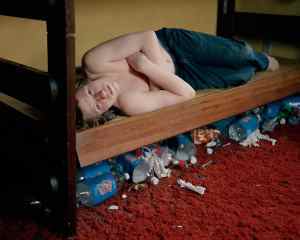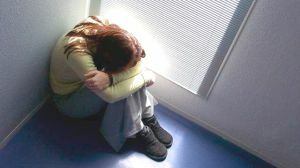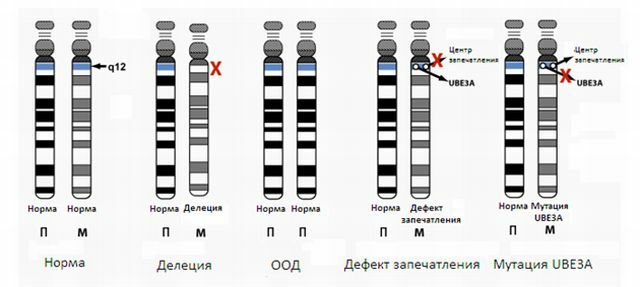 Weakness is usually one of the traits of a character that often causes numerous troubles - it reduces self-esteem, introduces into a depressed state, causes depression. But often this condition is a manifestation of such a violation as abulia.
Weakness is usually one of the traits of a character that often causes numerous troubles - it reduces self-esteem, introduces into a depressed state, causes depression. But often this condition is a manifestation of such a violation as abulia.
Abulia is a mental disorder of the nervous system, from which it is impossible to get out on your own. So what is this disorder and how is it treated?
Contents
- Saying abulia, we mean lack of will
- Etiology and pathogenesis of violation
- What can cause a violation of
- A combination of abulia with other
- syndromes Clinical picture and symptomatology
- Diagnosis
- Aims and methods of therapy
We say abulia, we mean lack of will
From the ancient Greek language the term "abulia"Means" lack of will. "In medicine, an abulia is a condition in which a pathological lack of will appears.
A person can experience constant attacks of laziness, it is covered by a feeling of indecision, lack of will, and the desire to fulfill certain specific duties that require compulsory fulfillment can also completely disappear.
This pathological disorder of the nervous system is a manifestation of apathy. It is not widespread, and the violation itself is often confused with weak-willedness. It is easiest to identify the abulia in an adult patient, in children this condition is usually accompanied by various concomitant problems.
Etiology and pathogenesis of
disorder Usually, symptoms of abulia can manifest in people with weak psyche, who are prone to various somatoform disorders.
Abulic syndrome can be manifested during disorders in the circulation of the right hemisphere of the brain in the frontal part. Usually this is due to traumatic head injuries or some serious brain disease.
Abogenous pathogenesis is associated with a decrease in dopaminergic neurotransmission in the frontal lobes of the brain. These shares are responsible for the purposeful motor functioning of the organism, the ability to manifest initiative processes, systematic activity, which is aimed at performing certain functions and overcoming difficulties.
Usually in patients with the presence of violations of the frontal part of the brain there is a state of inertia and inactivity.
Most doctors and specialists note that stress is the main factor that provokes the manifestation of an abulia.
The existence of an abulia leads to the deprivation of the main factor of a person's full existence - he ceases to be a person. This  is due to the fact that this violation contributes to the disappearance of a person's motivation, which provokes him to perform the functions to achieve the cherished goal.
is due to the fact that this violation contributes to the disappearance of a person's motivation, which provokes him to perform the functions to achieve the cherished goal.
Especially dangerous is this pathological spinelessness in childhood. Many parents may simply not notice the presence of this violation in their child and take him for a character trait - laziness, apathy, weak-willedness.
The most complex is considered to be an inheritance abortion, which occurs in children from the moment of birth. Many parents are happy when their child is very calm, quiet, for a long time sits in one place, instead of running and playing. And this condition should cause parents anxiety and be the first factor for carrying out an appropriate survey.
What can provoke a violation of
Abulia can manifest itself as a symptom of numerous disorders with a neuropsychiatric character, among others the following:
- periods after a stroke or traumatic brain injury;
- state of intoxication, hypoxia, various diseases of the nervous system of an infectious nature;
- tumor lesions of the brain;
- of Parkinson's disease, Huntington, Pick;
- presence of congenital dementia;
- depressive states;
- increased use of alcoholic beverages;
- drug dependence.
 Abulia often occurs in patients with schizophrenia. People with this pathological disorder often deteriorate in the state of the psyche over time, there is a weakening of the will impulse, there is an increase in passivity, they often lack the desire to perform simple and necessary actions.
Abulia often occurs in patients with schizophrenia. People with this pathological disorder often deteriorate in the state of the psyche over time, there is a weakening of the will impulse, there is an increase in passivity, they often lack the desire to perform simple and necessary actions.
A short-term occurrence of an abulia can manifest itself as a reaction to a trauma of a mental nature. This condition can last not very long, it passes after the resolution of a situation that has a traumatic effect on the psyche.
During a stupor with a depressive and apathetic character, as well as with catatonic stupor, the condition of the abulia can develop for 2-3 months, and may last for several years.
Combining Abulia with Other
Syndromes The forms of abulia can be light and temporary, accompanied by small deviations, reduced motivation, and heavier, up to complete suppression of the will. With the extreme form of lack of will, there may be no desire to perform elementary actions - get out of bed, wash, and so on.
Syndromes that accompany abulia:
- The depressive and asthenic-type syndrome , which is accompanied by elements of adynamia, neuroses, psychopathic disorders. During this violation, there is a short absence of willful motives and a decline in activity.
- Abulia periodic type .This form often occurs in addicts, alcoholics, in patients with severe somatoform disorders, in patients with schizophrenia. There can be a repetition of periods of lack of will, as well as psychoses of a manic-depressive type.
- Catatonic syndrome and stupor .This form is characteristic of schizophrenics, and also manifests itself in severe organic lesions of the brain. In this state there is a constant deficit of motivation and volitional impulses.
- Abulia can often be combined with the mutism - a complete lack of desire for conversation. Verbal contact with
 patients is disrupted, it is impossible to get answers to the questions from them.
patients is disrupted, it is impossible to get answers to the questions from them. - Apato-Abulian Syndrome .With this syndrome, there is emotional insufficiency, automatic movements. Patients have a complete closure in themselves, they have a lack of desire for communication, they show everything with their kind of complete indifference to the interlocutor, to close people, they have a complete loss of interest in their favorite activities, entertainment.
- Abyssical-akinetic syndrome .With this violation there is a combination of lack of will with partial or complete immobility. Often, inhibition may occur in the thought process.
The clinical picture and symptoms of
Psychotherapists and neurologists point out that during abulia, a pathological unwillingness to show interest and effort to various, sometimes necessary actions or before this favorite activities, or a complete lowering of the energy level of strong-willed symptoms, often appears.
Other characteristic clinical symptoms of abulia:
- the patient looks sloppy and sloppy;

- movements are slow, inhibited and not coordinated;
- there are problems with speech and emotional manifestations, often speech is slow;
- the patient has a complete lack of desire to communicate with other people, friends, close relatives, they have social isolation;
- speech becomes meager, facial expression disappears;
- there is a closed state, lack of activity;The
- person can not decide on his own;
- lost interest in all activities and entertainment, which before had been loved;
- before answering the question, a person can think and remain silent for a long time.
Diagnosis of
Abulia is not a single disease, it is usually a consequence of a symptom of a neurological or psychological disorder.
The main methods used to diagnose:
- for the beginning the doctor conducts a questioning and testing of the patient, due to this he makes a general anamnesis and establishes the presence of various concomitant diseases;
- magnetic resonance imaging is performed;
- is assigned a computed tomography;
- is assigned an ultrasound examination;
- performed an electroencephalography of the brain;
- it is necessary to hand over the general analysis of a blood.
Aims and methods of therapy
First of all, an abulia should be prescribed treatment of the underlying disease that accompanies it. Therapeutic treatment should be carried out only under the full control of a doctor - a neurologist, a psychotherapist.
Features of treatment depending on the concomitant disease:
- if the syndrome developed against the background of schizophrenia , then the appointment of atypical antipsychotics is prescribed;

- on the background of depressive states is prescribed the use of antidepressant drugs;
- if develops apato-abulic syndrome , then the use of Frenolone is often recommended, it is prescribed from 5 to 10 mg three times a day;
- during the development of apatiko abulic syndrome in schizophrenics for therapy Triftazin is effective, it is taken with 5 mg three times a day with Piracetamum on a single capsule 2 times a day, the dosage gradually increases every day by 5 mg and increases to 30-80 mg per day.
When suppressing volitional impulses, the use of Sulpiride is prescribed. It is prescribed for 0.2-0.4 grams per day. The maximum dose per day should not be more than 0.8 grams;
In addition, physiotherapy is prescribed to increase the activity of the nervous system, phototherapy, swimming, the use of therapeutic baths.
It is recommended to hold conversations with a psychotherapist to maintain the patient's psyche.



